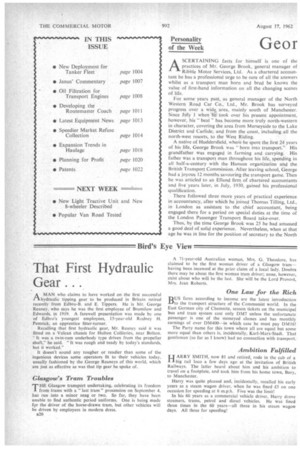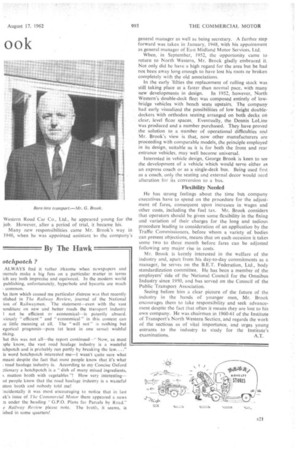Personality of the Week
Page 26

Page 27

If you've noticed an error in this article please click here to report it so we can fix it.
Geor ook
ASCERTAINING facts for himself is one of the practices of Mr. George Brook, general manager of Ribble Motor Services, Ltd. As a chartered accountant he has a professional urge to be sure of all the answers whilst as a transport man born and bred he knows the value of first-hand information on all the changing scenes of life.
For some years past, as general manager of the North Western Road Car Co., Ltd., Mr. Brook has surveyed progress over a wide area, mainly south of Manchester. Since July 1 when Ii took over his present appointment, however, his " beat " has become more truly north-western in character, covering the area from Merseyside to the Lake District and Carlisle. and from the coast, including, all the
north-west resorts, to the West Riding. ,
A native of Huddersfield, where he spent the first 24 years of his life, George Brook was "born into transport." His grandfather was engaged in farming and carrying. His father was a transport man throughout his life, spending in all half-a-century with the Hanson organization and the British Transport Commission. After leaving school, George had a joyous 12 months savouring the transport game. Then he was articled to an Elland firm of chartered accountants and five years later, in July, 1930, gained his professional qualification.
There followed three more years of practical experience in accountancy, after which he joined Thomas Tilling, Ltd., in London as assistant to the chief accountant, being engaged there for a period on special duties at the time of the London Passenger Transport Board take-over.
Thus, by the time George Brook was 25 he had amassed a good deal of solid experience. Nevertheless, when at that age he was in line for the position of secretary to the North Western Road Car Co.. Ltd., he appeared young for the job. However, after a period of trial, it became his. Many new responsibilities came Mr. Brook's way in 1946, when he was appointed assistant to the company's general manager as well as being secretary. A further step forward was taken in January, 1948, with his appointment as general manager of East Midland Motor Services, Ltd.
When, in September, 1952, the opportunity came to return to North Western, Mr. Brook gladly embraced it. Not only did he have a high regard for the area but he had not been away long enough to have lost his roots or broken completely with the old associations.
In the early 'fifties the replacement of rolling stock was still taking place at a faster than normal pace, with many new developments in design. In 1952, however, North Western's double-deck fleet was composed entirely of lowbridge vehicles with bench seats upstairs. The company had early visualized the possibilities of low height doubledeckers with orthodox seating arranged on both decks on clear, level flcor spaces. Eventually, the Dennis LoLine was produced and a number purchased. They have proved the solution to a number of operational difficulties and Mr. Brook's view is that, now other manufacturers are proceeding with comparable models, the principle employed in its design, suitable as it is for both the front and rear entrance vehicles, may well become universal.
Interested in vehicle design, George Brook is keen to see the development of a vehicle which would serve either as an express coach or as a single-deck bus. Being used first as a coach. only the seating and external decor would need alteration for its conversion to a bus.
Flexibility Needed He has strong feelings about the time bus company executives have to spend on the procedure for the adjustment of fares, consequent upon increases in wages and other costs, including the fuel tax. Mr. Brook considers that operators should be given some flexibility in the fixing and variation of their charges for the long and tedious procedure leading to consideration of an application by the Traffic Commissioners, before whom a variety of bodies can present objections, means that on each occasion it takes some two to three month before fares can be adjusted following any major rise in costs.
Mr. Brook is keenly interested in the welfare of the industry and, apart from his day-to-day commitments as a manager, he serves on the B.E.T. Federation, Ltd., body standardization committee. He has been a member of the employers' side of the National Council for the Omnibus Industry since 1950, and has served on the Council of the Public Transport Association.
Seeing before him a clear picture of the future of the industry in the hands of younger men, Mr. Brook encourages them to take responsibility and seek advancement despite the fact that often it means they are lost to his own company. He was chairman in 1960-61 of the institute of Transport's North Western Section, and regards the work of the sections as of vital importance, and urges young entrants to the industry to study for the institute's
examinations. A.T.












































































































